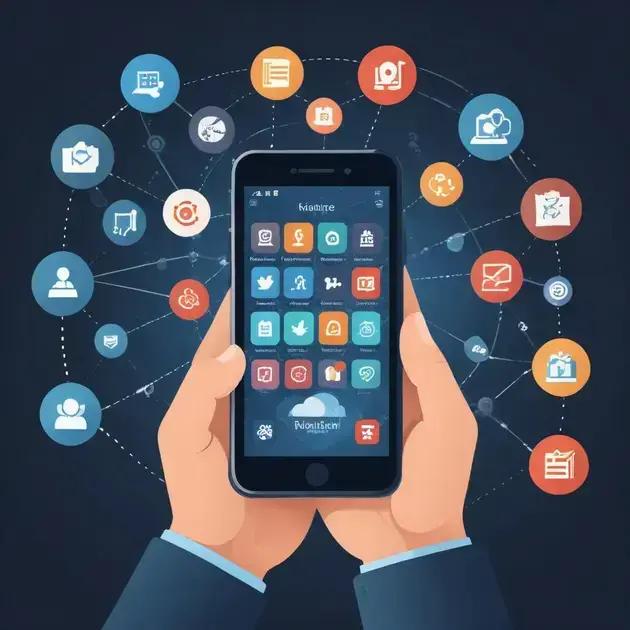Mobile CRM is a powerful tool that enhances customer relationship management by allowing access to customer data on mobile devices. It improves communication, increases productivity, and offers valuable insights through features like real-time data access and user-friendly interfaces.
Mobile CRM is revolutionizing the way businesses engage with customers. By enabling instant access to customer data on-the-go, it empowers teams to enhance communication, build relationships, and drive sales effectively. In this article, we’ll delve into what Mobile CRM is, its benefits, how to select the ideal solution, and best practices for a successful implementation.
What is Mobile CRM?
Mobile CRM, or Mobile Customer Relationship Management, is a technology that allows businesses to manage their interactions with customers using mobile devices. This innovative approach provides sales teams, customer service representatives, and marketing professionals the ability to access customer information and operations from anywhere, at any time.
Using Mobile CRM, users can track communication history, monitor customer preferences, and manage tasks efficiently, all from their smartphones or tablets. Thanks to this flexibility, employees are empowered to stay connected with clients outside the traditional office environment.
Features of Mobile CRM
Common features of mobile CRM solutions include:
- Real-time Data Access: Users can retrieve customer information instantly, which enhances decision-making.
- Contact Management: Easily store and organize customer contact details.
- Task Management: Employees can create, assign, and track tasks through mobile applications.
- Sales Pipeline Tracking: Users can monitor sales progress on the go, leading to timely follow-ups.
- Reporting and Analytics: Access to reports and dashboards for analyzing performance metrics.
Importance of Mobile CRM in Today’s Business World
In our fast-paced business landscape, having a Mobile CRM system is increasingly important. It not only improves customer engagement but also enhances productivity and collaboration within teams. By providing essential tools at their fingertips, organizations can ensure their employees meet customer needs promptly and effectively.
Key Benefits of Mobile CRM

Mobile CRM offers several key benefits that can significantly improve business operations and customer relationships. By leveraging mobile technology, organizations can enhance their efficiency and responsiveness to client needs.
Increased Accessibility
One of the primary benefits of Mobile CRM is the ability to access customer data anywhere, anytime. Sales representatives and customer service agents can view real-time information on their mobile devices, enabling them to respond promptly to inquiries and make informed decisions while on the go.
Improved Communication
Mobile CRM facilitates better communication among team members. With features like instant messaging and collaboration tools, employees can stay updated, share information, and coordinate efforts seamlessly, which leads to improved teamwork and productivity.
Enhanced Customer Engagement
By utilizing Mobile CRM, businesses can foster better relationships with their customers. Mobile access allows representatives to view customer histories, preferences, and engagement patterns, enabling personalized interactions that enhance customer satisfaction and loyalty.
Increased Productivity
Mobile CRM streamlines workflows by automating tasks and reminders. Employees can manage their schedules, track sales activities, and update customer records directly from their mobile devices. This efficiency helps teams focus on higher-value tasks that drive business growth.
Data-Driven Insights
With Mobile CRM, businesses can gather and analyze data efficiently. Real-time reporting and analytics features provide insights into customer behaviors, sales trends, and team performance, helping organizations make data-driven decisions that align with their strategic goals.
How to Choose the Right Mobile CRM Solution
Choosing the right Mobile CRM solution is crucial for enhancing your business efficiency and customer interactions. There are several factors to consider that can guide your decision-making process.
Identify Your Business Needs
Start by assessing the specific needs of your business. Consider the size of your team, the nature of your customer interactions, and the features that are necessary for your operations. Make a list of must-have features such as contact management, task assignments, and customer insights.
Evaluate User Experience
The user experience of a Mobile CRM is important. A complicated interface can hinder productivity. Look for solutions that provide intuitive and user-friendly designs, making it easy for your team to navigate and utilize the platform effectively. It may be beneficial to request a demo to see how it functions in practice.
Integration Capabilities
Check how well the Mobile CRM integrates with your existing tools and systems. Seamless integration with other applications like email marketing, accounting software, and project management tools can streamline workflows and improve overall efficiency.
Cost Considerations
Consider the total cost of ownership, which includes not only the subscription fees but also training costs and potential upgrades. Look for solutions that offer good value for the features provided and assess whether the CRM fits within your budget.
Customer Support and Training
Significant customer support and training can make a difference in successful implementation. Ensure that the CRM provider offers robust support channels, such as video tutorials, chat support, and comprehensive documentation to assist your team when needed.
Best Practices for Implementing Mobile CRM

Implementing a Mobile CRM system effectively requires careful planning and execution. Adopting best practices helps ensure that the transition is smooth, and that your team can leverage the full potential of the mobile CRM solution.
Involve Your Team Early
Engage your team in the selection and implementation process. Their feedback is invaluable in understanding what features will be most beneficial for daily tasks. Encourage team members to express any concerns or preferences to enhance buy-in and facilitate smoother adoption.
Provide Comprehensive Training
Training is critical for a successful implementation. Offer detailed training sessions that cover how to use the Mobile CRM effectively, including all features and tools available. Ongoing support and refresher training can also help employees stay updated on new functionalities.
Set Clear Goals and Metrics
Define clear objectives for what you want to achieve with the Mobile CRM. Establish metrics to evaluate progress, such as improved response times, increased sales activities, or enhanced customer satisfaction. Regularly review these metrics to assess success and make necessary adjustments.
Encourage Regular Feedback
Solicit regular feedback from users after implementation. This can help identify any challenges they face and areas where the CRM could be improved. Implementing changes based on user input fosters a culture of continuous improvement and user satisfaction.
Integrate with Existing Systems
Ensure the Mobile CRM integrates seamlessly with your existing software and business processes. Compatibility with tools such as email marketing, customer service platforms, and project management systems can enhance efficiency and provide a holistic view of customer interactions.
Future Trends in Mobile CRM
The landscape of Mobile CRM is constantly evolving, with new trends and technologies shaping its future. Staying informed about these developments can help businesses remain competitive and enhance their customer relationships.
Artificial Intelligence Integration
Artificial Intelligence (AI) is expected to play a significant role in the future of Mobile CRM. AI can analyze large volumes of data, providing valuable insights and recommendations for sales strategies. This integration can help sales teams identify potential leads, predict customer behavior, and personalize engagement efforts.
Increased Focus on User Experience
As technology advances, there will be a stronger emphasis on delivering an outstanding user experience. Mobile CRM applications are likely to become even more intuitive and user-friendly. Features such as voice recognition and gesture controls may become standard, making it easier for users to navigate and interact with the system.
Greater Personalization
Future Mobile CRM solutions will likely provide enhanced personalization features. By leveraging data analytics, businesses can tailor interactions based on individual customer preferences and behaviors. This personalization can lead to improved customer satisfaction and loyalty.
Mobile-First Design
The importance of a mobile-first design will continue to grow as more businesses embrace mobile technology. Solutions that prioritize mobile functionality and design will be essential for companies seeking to streamline operations and enhance mobility for their teams.
Integration with IoT Devices
As the Internet of Things (IoT) expands, Mobile CRM systems will increasingly integrate with IoT devices. This integration can provide real-time data and alerts that inform decision-making and improve customer engagement. For example, sales representatives could receive instant notifications regarding changes in customer behavior based on data collected from connected devices.
In Summary: Embrace the Future of Mobile CRM
Implementing a Mobile CRM system can transform how your business interacts with customers. By leveraging mobile technology, companies can improve efficiency, enhance communication, and deliver better customer experiences.
As we look to the future, trends such as AI integration, user-friendly designs, and personalization will continue to shape Mobile CRM. By staying informed and adapting to these changes, businesses can not only stay competitive but also thrive in a mobile-driven world.
Investing in the right Mobile CRM solution today will pay off in the long run, enabling you to build stronger relationships with your customers and streamline operations effectively.
FAQ – Frequently Asked Questions about Mobile CRM
What is Mobile CRM?
Mobile CRM is a technology that allows businesses to manage customer relationships and access customer data using mobile devices.
How can Mobile CRM benefit my business?
Mobile CRM enhances communication, increases accessibility to customer data, and improves overall productivity for your team.
What features should I look for in a Mobile CRM?
Key features include easy user interface, real-time data access, task management, and integration capabilities with other systems.
Is training necessary when implementing Mobile CRM?
Yes, providing comprehensive training helps your team use the Mobile CRM effectively and can significantly improve adoption rates.
How do I choose the right Mobile CRM solution?
Assess your business needs, consider user experience, evaluate costs, and check for integration capabilities with your current systems.
What trends should I watch for in Mobile CRM?
Future trends include AI integration, mobile-first designs, greater personalization, and connectivity with IoT devices.




